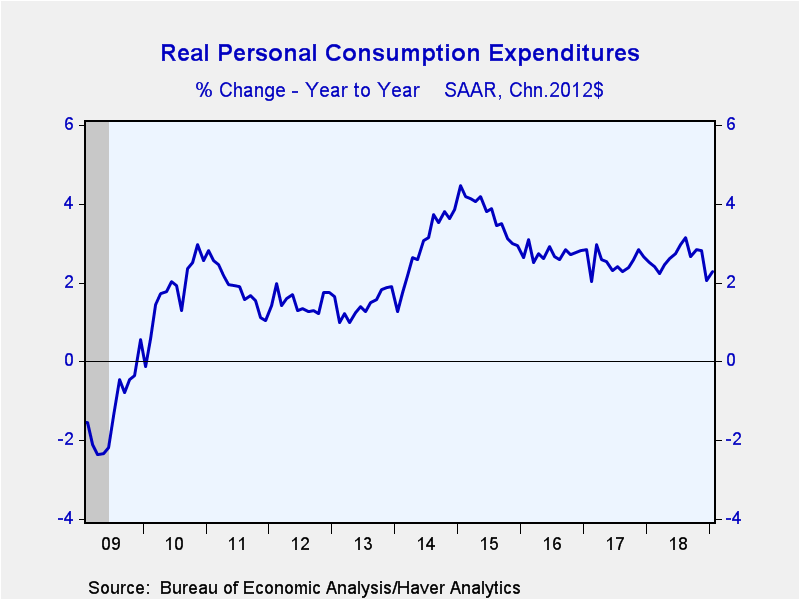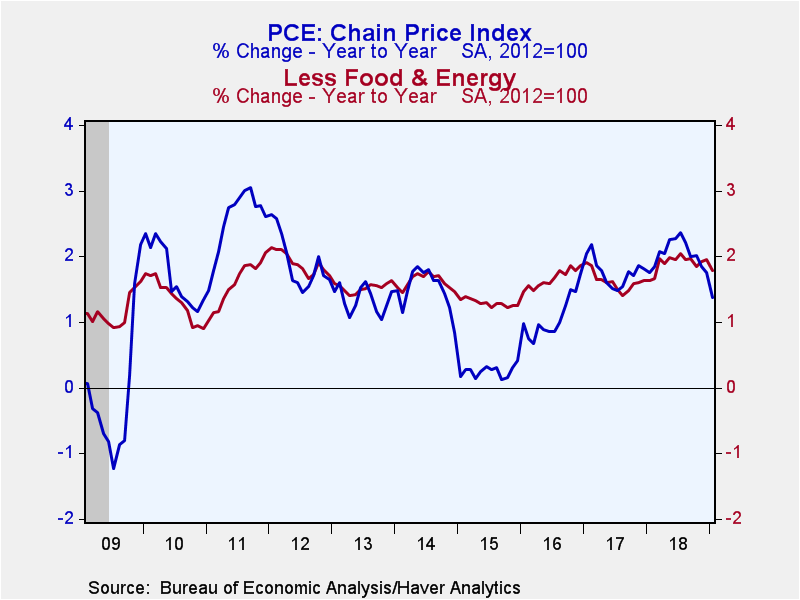 Global| Mar 29 2019
Global| Mar 29 2019U.S. Personal Spending Growth Is Negligible; Incomes Rise Modestly
by:Tom Moeller
|in:Economy in Brief
Summary
Personal consumption expenditures improved 0.1% (3.7% y/y) during January following a 0.6% December decline, revised from -0.5%. The gain fell short of a 0.3% rise expected in the Action Economics Forecast Survey. The Commerce [...]
Personal consumption expenditures improved 0.1% (3.7% y/y) during January following a 0.6% December decline, revised from -0.5%. The gain fell short of a 0.3% rise expected in the Action Economics Forecast Survey. The Commerce Department did not publish February consumption figures due to the partial government shutdown. The figures will be available on April 29.
Durable goods spending was dragged 1.2% lower (0.0% y/y) by a 5.3% decline (-3.7% y/y) in motor vehicle purchases. The decline was countered by a 1.4% rise (1.8% y/y) in purchases of recreational goods & vehicles. Spending on home furnishings & appliances rose 0.9% (2.4% y/y). Spending on nondurable goods gained 0.3% (1.4% y/y) despite a 5.1% drop (-11.0% y/y) in gasoline purchases, pulled downward by a decline in prices. Adjusted for the price decline, gasoline purchases rose 0.9% (0.2% y/y). Food & beverage buying jumped 1.1% (3.1% y/y) and reversed the December decline, while apparel spending increased 0.2% (2.2% y/y). Services spending rose 0.2% (4.9% y/y), the weakest rise since February of 2018. Recreation services purchases fell 0.6% (+2.6% y/y) but spending at restaurants gained 0.4% (5.7% y/y). Housing & utilities consumption also rose 0.4% (4.2% y/y) while health care spending rose 0.3% (4.0% y/y).
The personal saving rate eased to 7.5% during January from 7.7%. These levels were the highest since Q1'18. Personal saving rose 12.1% y/y.
Unlike the consumption figures, the income data are up to date. Personal income rose 0.2% (4.2% y/y) during February after a 0.1% slip in January. A 0.3% rise had been expected. Wages and salaries rose a steady 0.3% (4.2% y/y). Rental income strengthened 0.9% (4.2% y/y) while proprietors' incomes improved 0.7% (4.7% y/y). Transfer payments rose 0.4% (6.8% y/y) as Medicare receipts jumped 1.0% (9.7% y/y), about as they have for several months. Social security receipts rose 0.2% (6.8% y/y) following a 3.1% jump. Jobless insurance payments gained 0.4% (-7.6% y/y) following three months of strong increase.
In constant dollars, personal disposable income declined 0.2% (3.0% y/y) in January and personal spending inched 0.1% higher (2.3% y/y).
The PCE chain price index eased 0.1% (+1.4% y/y) in January after a 0.1% gain, while excluding food & energy, the index rose 0.1% (1.8% y/y). Energy prices fell 3.2% (-6.4% y/y), down for the third straight month, while food prices improved 0.2% (0.8% y/y).
The personal income and consumption figures are available in Haver's USECON database with detail in the USNA database. The Action Economics figures are in the AS1REPNA database.
Global Shocks and the U.S. Economy is the title of yesterday's speech by Fed Vice Chair Richard H. Clarida and it can be found here here.
Tom Moeller
AuthorMore in Author Profile »Prior to joining Haver Analytics in 2000, Mr. Moeller worked as the Economist at Chancellor Capital Management from 1985 to 1999. There, he developed comprehensive economic forecasts and interpreted economic data for equity and fixed income portfolio managers. Also at Chancellor, Mr. Moeller worked as an equity analyst and was responsible for researching and rating companies in the economically sensitive automobile and housing industries for investment in Chancellor’s equity portfolio. Prior to joining Chancellor, Mr. Moeller was an Economist at Citibank from 1979 to 1984. He also analyzed pricing behavior in the metals industry for the Council on Wage and Price Stability in Washington, D.C. In 1999, Mr. Moeller received the award for most accurate forecast from the Forecasters' Club of New York. From 1990 to 1992 he was President of the New York Association for Business Economists. Mr. Moeller earned an M.B.A. in Finance from Fordham University, where he graduated in 1987. He holds a Bachelor of Arts in Economics from George Washington University.
More Economy in Brief
 Global| Feb 05 2026
Global| Feb 05 2026Charts of the Week: Balanced Policy, Resilient Data and AI Narratives
by:Andrew Cates










